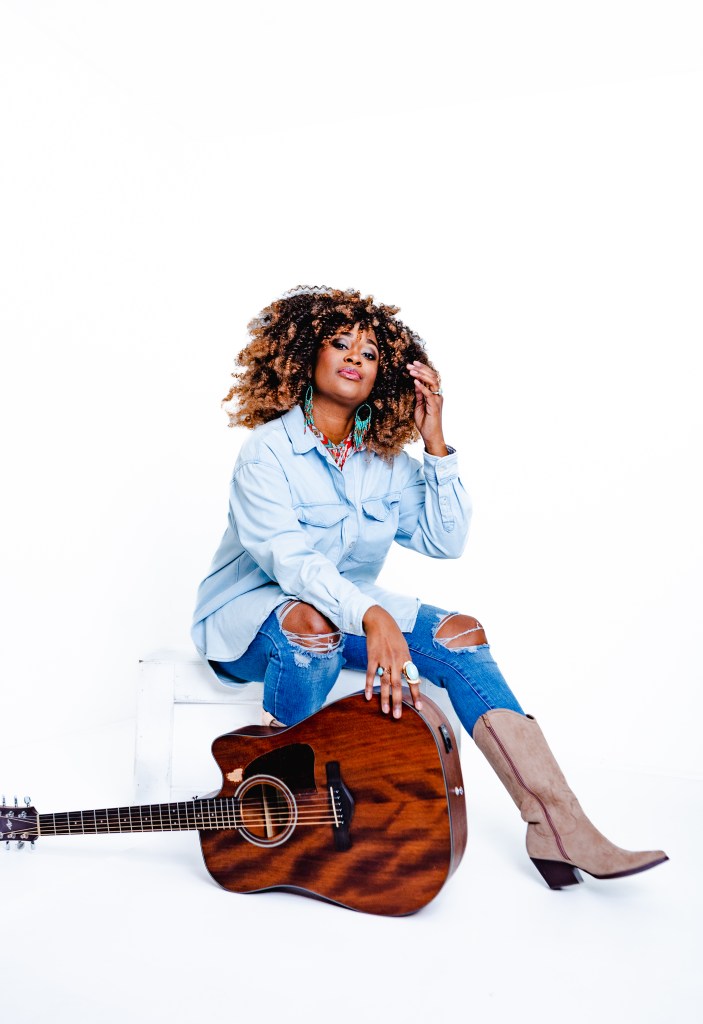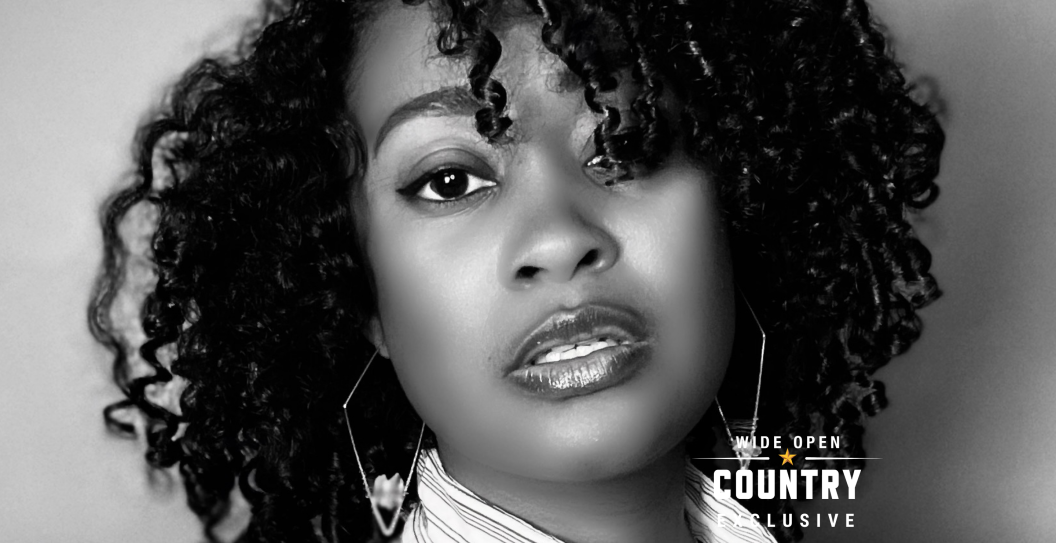"I learned that I am capable," says Roberta Lea. With the exception of "Papa Was a Rolling Stone," a Temptations cover, she wrote every song on her debut album and served as an executive producer. Lea chisels Too Much of a Woman with her own singular perspective -- that of a Black woman from Virginia who is unafraid of carrying both strength and vulnerability. She takes up space, and she's unafraid of calling herself a legend.
Videos by Wide Open Country
"She is a legend," Lea speaks in the introductory song "Somewhere in the Tide." That presence informs the album's overarching story about a woman learning her worth and finally doing the internal work. Even in the quiet moments, there's a sense of command, determination, and resilience that what Lea is doing is far more than performing music. She's staking a claim on the country music world. Too Much of a Woman declares to the world that Roberta Lea is her name, and she's here to stay.
Wide Open Country caught up with Roberta Lea to discuss destiny, being confident, vocal choices, and the album's threaded narrative.
With all your wins this year, including being named as part of CMT Next Women of Country, do you believe there's a greater design for your life?
We have more bargaining power in this thing called life than we give ourselves credit for. And so I've always been confident in pursuit of my dreams and what I want. When it came down to going to college or when it came down to dating or when it came down to where I was, I was picky, and I knew what I wanted. I never really compromised in the things that I wanted and I feel it's playing out the same way in music. When you quote-unquote place your order at the universe's restaurant, you can't be confused about what you want. You have to say what it is that you want and you have to expect to get it. That's kind of my analogy when it comes to life. I marinate in that flavor and that grace and that energy - the vibrations and all of the things. I'm here for it, and I feel when you put out what you put out is what you receive.

Courtesy of artist
Looking back to when you quit your teaching job in 2021, do you wish you would have pursued music sooner?
I wrestled with that for quite a while. What caused me to hesitate to pursue it is that once you get to your late twenties, there's some sort of stigma in the music industry. At least, it appears to be. That was before I started to pay attention and notice that there's such a range in success for a lot of people. You have your Beyonce and Taylor Swift. But you also have your Tina Turner who reached their peak at 40, and you have your Bill Withers who starts in his thirties and funds his own record. You have Anita Baker, on a long list of artists who started around my age and reached a point of success, as well. When I decided to ignore my own personal blocks when it came to ageism and what I could and couldn't do based off of where I got started, I finally put that aside and just decided to enjoy the journey. I'm obviously reaping the benefits of that.
One of the most fascinating aspects of the record is the spoken word moments peppered throughout the record, cutting the record like chapters of a book.
I would have to say that if there was an album that influenced this one it would have been The Writing's on the Wall by Destiny's Child. The idea popped in my head of speaking through each and every one of those moments. Then, I recalled that record. There are a lot of records where these interludes are meant to walk you through the story. Being a former teacher, I have that knack, especially when I perform live, of walking people through the story. I'm not just gonna finish one song and just start another. I have that natural tendency to walk people through and guide them through the music. It's so much more than just a song.

Courtesy of artist
You start the album with a powerful declaration: She is a legend. What a way to start things off!
As women, we have quite a legendary status in history. That was also just my way of pumping myself up. I feel like we have to recognize the legends in ourselves before anybody else does.
In "Somewhere in the Tide," you sing, "We are tall, and we are rooted like the Appalachian trees." There's such vivid detail in this song.
This song is an ode to my home state, Virginia. It's such an intricate and complex piece to this puzzle that is United States history. Geographically, it's so interesting to me. I'm a part of so many different music circles. I'm a part of the songwriter circle, the country circle, the hip-hop circle. I kind of make my way everywhere. I've gotten to know my music community, and I see how rooted we are in the legacy that musicians in Virginia have created for us. We're rooted in that foundation of Patsy Cline, Ella Fitzgerald, The Dave Matthews Band - and the list just goes on and on. I know in recent pop culture, everyone would be immediately familiar with Missy Elliott, Pharrell and Timberland. The legacy in Virginia goes so far. You got Bristol, the birthplace of country music, and that tie between Virginia and Tennessee. I knew I had to connect the geographical uniqueness of Virginia to the musical uniqueness of Virginia.
Another potent lyric on the record comes with "So Much More." In it, you sing, "The only reason I survive is because you're holding my hand."
This one is very important to the album. The record is called Too Much of a Woman, and the leading track is this spicy boss babe anthem. There are a lot of tracks that have this toughness about them. The thing about this record is that our vulnerability has been weaponized against us for so long. The fact that we cry, which is such a natural human event, has been used to brutalize. It's an excuse why we're not fit for leadership or whatever. It really is a travesty that our vulnerability has been used to keep us in a certain place. The message of the entire record is I should be respected because of both weakness and strength. I should be respected for what I bring to the table. As a woman I'm not afraid, nor am I ashamed of being vulnerable. I'm not ashamed of the tears that I cry and I'm not ashamed of saying that I need help.
With "Midnight Matinee," the vocal is recorded differently than the rest of the record. Why make that choice?
So, this is about a woman's intuition. My particular intuition is through my dreams. There have been a lot of choices that I've made over the years that were influenced by the dreams I had at night. I'm talking from the perspective from a different reality when it comes to dreams. I wanted the song to reflect, vocally, that different reality in comparison to the rest of the record. The rest of the record is speaking to the world on the outside, and in this particular song, it's all internal.I wanted some vocal effects that would reflect that internal space.

Courtesy of artist
"Threw It All" is the darkest song on the record and feels like a turning point.
When I was doing the exclusive listening party for my Kickstarter supporters, I described the album and how there's a character we're following. It's this woman who's too much. With "Somewhere in the Tide" and "Girl Trip," she's on her little high horse. She knows who she is, and she's a baddie and likes to have fun. And she's a legend. She's living her best life. Then, once we get to "Too Much of a Woman" and "Papa Was a Rolling Stone," we get introduced to her antagonist. We meet this energy or the spirit or what we don't know, misogyny, patriarchy. We have all sorts of names that could probably fit the bill, but whatever it is, that's who she meets in this album. She has to figure this antagonist out.
When we get to "Midnight Matinee," it's talking about her dreams being her intuition and then through it all is a literal dream. The dreamscape parts of a house represent certain things. You know, the basement and the subconscious and suppressed feelings and emotions versus the attic where there's this enlightenment. She's having her aha moment. She's figured this antagonist out, and she taps into her intuition. She says, "You know what? Enough is enough, I'm done." And so we start seeing her do the work that it takes to free herself from those blocks, from that internal misogyny, or from those that doubt her or those feelings of imposter syndrome.
She's doing the internal work to free herself. She's got to deal with some trauma, but she is finally brave enough to do that because she wants to be her full and authentic self.
How has that reflected back into your own life?
My husband and I are both very big on doing the internal work. We've been that way for a really long time. I've been that way since I was younger, and I feel like I'm getting better as I get older. At the end of the day, just like I mentioned earlier, we have more bargaining power than we give ourselves credit for. And that's what the internal work does because if you think about what she's doing with the house in this song, she's renovating it. So when she patches up the holes in the walls and cleans up, if she wants to sell the house, she's gonna be able to. We're all trying to convince another space that we have value. We're all trying to sell ourselves.

Courtesy of artist
Vocally, you get to really play on the record. What was that process for you?
I did the listening party here in Virginia Beach, and I talked a lot about reciprocity When creating the album, I had a lot of intention of making sure the variety of the songs unified to the variety of emotional and social vulnerability when it comes to the lyrics. That also plays a role when it comes to making sure the vocals agree with the message that takes place in the story or in the song. There are some songs where she has to let it out. "Make up Your Mind," for example, has this build vocally. There's a build musically, and there's a build lyrically where she is set up and she's about to explode. We feel that explosion at the end of the song.
There are other vocal perspectives, like with "Stronger This Time" where there's not a ton of fluctuation. There's a steady expression in that song, revealing that she is getting steady and she's practicing healthy coping mechanisms. In "Threw It All," there's this emotional roller coaster that she's going through when she does the internal work. In the first verse, the vocals are pulled back. But then there, there's this intensity and the shock and energy that somebody would feel when they're confronting their trauma. Among the lyrics, the vocals, and the music, I tried to do my best to make sure they all did their job when it came to telling that story.




